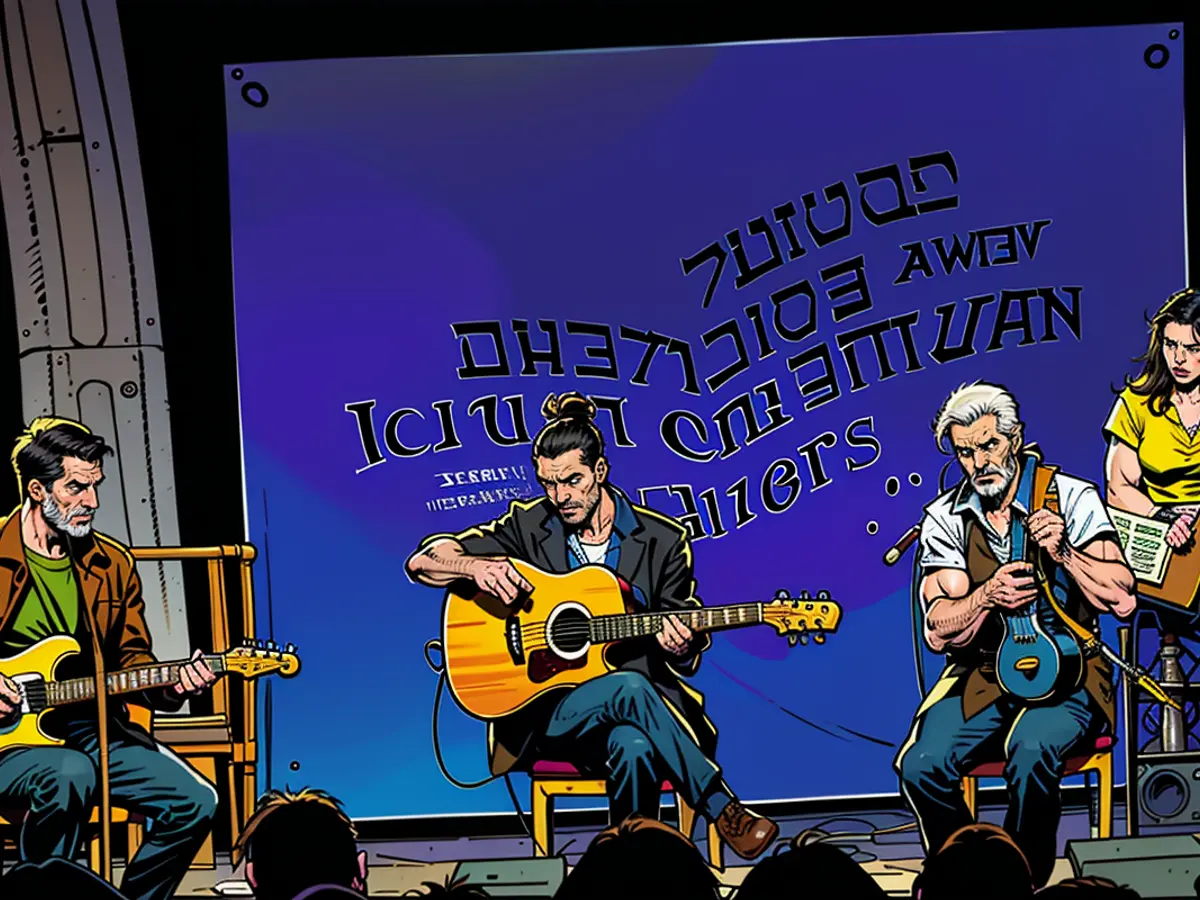Viewpoint: Quelling Jewish Literary Voices Harmful to Society.
This year's Jerusalem International Writers Festival, which took place not too long ago, was noticeably different from previous editions. Something was noticeably missing.
Julia Fermentto-Tzaisler, the artistic director of the festival, debated whether the event should go ahead at all in a time when Israeli society was still reeling from the death of over a thousand people due to Hamas's attack on October 7. Over 300 soldiers had also been killed since then, and there were countless Israelis still being held hostage in Gaza. The Israeli offensive since the attack had left more than 37,000 Palestinians dead in Gaza, as per the Hamas-run health ministry, and large swathes of the territory had been completely destroyed.
The name of the festival was the first thing that seemed different. It was simply called the Jerusalem Writers Festival - the word "international" was dropped from the title for the first time since its inception in 2008, reflecting the lack of interest from writers abroad to attend the festival while Israel is engaged in a war in Gaza. Festival organizers informed me that numerous prominent American writers who had initially agreed to participate had later backed out, either out of safety concerns or fearing the backlash should they headline a festival in Israel.
Despite the bleak situation, Fermentto-Tzaisler, an Israeli author known for penning two successful novels, firmly believed that a gathering centered around literature was more important than ever.
"The moment I decided I didn't want to cancel, and I believe in the power of literature to change people's hearts and minds - to evoke empathy and humanity, I was pretty determined to make it happen at all costs. Literature is a bridge between human beings, and it belongs to humanity as a whole," she emphasized before the festival.
These sentiments resonated with me, and they sound profound on paper. Since the start of the war almost eight months ago, Israeli authors, artists, musicians, and filmmakers have been boycotted, booed, and banned like never before. During wartime, we need literary minds to lead the way. Those who have chosen to boycott literary festivals and other cultural outlets are missing an opportunity to win over hearts and minds - and envision a better future.
Examples abound of how the fallout from the ongoing war is casting a dark cloud over the literary world. The recent Hay Festival, held annually in Hay-on-Wye in Wales, was rocked by numerous artists canceling their plans to attend due to the festival's sponsorship by a investment management firm that does business with Israel. The festival eventually caved and announced it would temporarily sever ties with the sponsor, Baillie Gifford, which had been the festival's main sponsor since 2016. Major literary events were also affected by the war, causing the cancellation of the World Voices Festival by PEN America.
In her statement announcing the cancelation in late April, PEN America CEO Suzanne Nossel sounded disheartened. "We share the anguish over the loss of life and devastation of the war. We are listening to our critics. We now face a campaign that casts our struggle to reflect complexity, uphold our identity as a diverse organization, and remain true to our principles as a moral abdication. The perspective that engaging with those who hold a different point of view allows for dialogue is being undermined," she wrote.
In a letter announcing their withdrawal from the festival in March, a group of writers criticized PEN for insufficiently supporting Palestinians. "In the context of Israel's ongoing war on Gaza, we believe PEN America has betrayed the organization's professed commitment to peace and equality for all, and to freedom and security for writers worldwide," the letter read. Besides canceling the festival, PEN set up a $100,000 emergency fund for Palestinian writers, as reported by AP.
It's no surprise that with such destruction and senseless violence taking place in the Middle East, the literary world is impacted. But it's unfortunate that it resulted in the cancellation of the festival, where meaningful exchanges between authors and audiences would have taken place and prestigious awards with significant financial support would have been given to the authors - a significant blow to an already struggling arts community.
Having said that, the cancellations and controversies extending beyond Jewish writers. But the silencing, which is hurting everyone, has felt particularly targeted towards Jewish writers. And as the New York Times writer Nicholas Kristof put it, "If you champion the human rights of only Israelis or only Palestinians, you don't really care about human rights."
Since I went to the muted introduction of the Jerusalem Writers Festival, a Jewish writing and artwork creator called Miriam Libicki was denied entry to a cartoon convention in Vancouver, and the Israeli ladies' soccer group faced hostility from pro-Palestinian protestors in the European Championship preliminary competition between Scotland and Israel, the tensions have become so hot that the game was conducted without fans in an empty arena.
The primary point: Israelis and anyone with affiliations to Israel must stay away from the public arena, regardless of whether they are scoring goals, creating art, or composing books. Some Jewish writers claim they're being blacklisted or asked to openly declare their anti-Zionist views before being granted a seat at the table or a spot in the program.
I acknowledge the right to protest against any government and to refuse to participate in an event that doesn't align with one's values. However, there's something disturbing about the fervor to isolate everything Israeli, followed by an astounding indifference to the mass murders carried out by Hamas on October 7 and their history of suicide bombings on buses and cafes. Do I even have to mention it?
It appears that if there's a place where people can interact, share ideas, and be exposed to something different from their own, it's the world of literature. Some might say that testing writers for literary loyalty, which almost sounds like 1950s McCarthyism and much darker periods in Europe, not only represents missed opportunities for thought-provoking exchanges, but also devalues the objective of our cultural spaces and texts.
Sir Simon Schama – a British historian, Emmy-winning documentarian, and currently a University Professor at Columbia University, and one of the few foreign writers who agreed to be a guest of the Jerusalem event – told me in an interview between sessions that the purpose of such an open forum among authors is to foster a "theater of free debate and discussion, not gladiatorial games." He was disappointed by the lack of global writers present here and condemned what he called the "boycott siege" of the Hay Festival in the UK.
Crucial queries emerge
This brings up some fascinating questions. Do these boycotts make a difference? Do they produce change, or just leave the boycotted feeling more ostracized and isolated? Based on my recent visit to Israel, I believe it's largely the latter. The Israelis with the most influence by this boycott are already on the left: They disapprove of Prime Minister Benjamin Netanyahu and have been demonstrating against him since he attempted to revise the nation's democratic institutions last year. They feel even more agitated now that he seems to be prioritizing "total victory" over Hamas instead of what most believe should be his primary objective: saving hostages' lives.
There were a few international authors in attendance – John Irving agreed to come but caught Covid and had to attend via Zoom – but the overall atmosphere was noticeably less inclusive than the last five times I attended the festival, even in its first year. Naturally, in a nation covered in photos of killed and kidnapped citizens, the event was bound to have a more self-focused tone.
The opening night included a commemoration for October 7, featuring authors and poets impacted by the war, as well as previously unheard voices who lost family members on that day. An educational quiz night for Harry Potter enthusiasts, for instance, was dedicated to Noya Dan, a 12-year-old girl who was killed along with her grandmother in one of the kibbutzim Hamas targeted.
In another significant moment, renowned Israeli novelist Eshkol Nevo took the stage under the stars and read a type of prose poem about willingly agreeing to go wherever he has been invited since October 7, addressing the grieving, the hurt, the traumatized. Her words: "I learned in recent months what power and significance there is in words, and what capacity we have, as storytellers, to heal and to provide hope. From the beginning of this war, it seems I've been much more therapist than writer."
Perhaps it's because we depend on writers to help us comprehend our own suffering and the suffering of others. It's likely this consideration led me to write a novel centered around an Iraqi protagonist after covering the war in Iraq since 2003. Relieved when Iraqi friends confirmed that I had accurately represented them, I was heartened when those closer to home expressed they could empathize with Iraqis through this character in a way they previously couldn't. I felt I had accomplished something significant, directly related to the reasons we read and write. If a book doesn't allow us to dive into someone else's world and emerge with a clearer, more accurate understanding of humanity, I'm not sure what could.
I'm certain that it was this act of reading and conversing that led me to appreciate the tribulations that Palestinians faced under the occupation. I eventually evolved into a proponent of a two-state resolution or any practical arrangement that would allow Israelis and Palestinians to coexist in peace and honor. By engaging in one another's literature and engaging in conversations about something more significant than the immediate issues, we can move closer to achieving this reality. I choose to believe that imagining this future is not only the realm of fiction.

Read also:
In light of the ongoing political tensions, many international writers have chosen to withdraw from participating in literary events in Israel, citing safety concerns or fear of backlash.
The debate over boycotting literary events in Israel has sparked strong opinions, with some arguing that engaging with different perspectives allows for dialogue and the envisioning of a better future, while others believe that certain writers are being isolated due to their affiliations with Israel.







